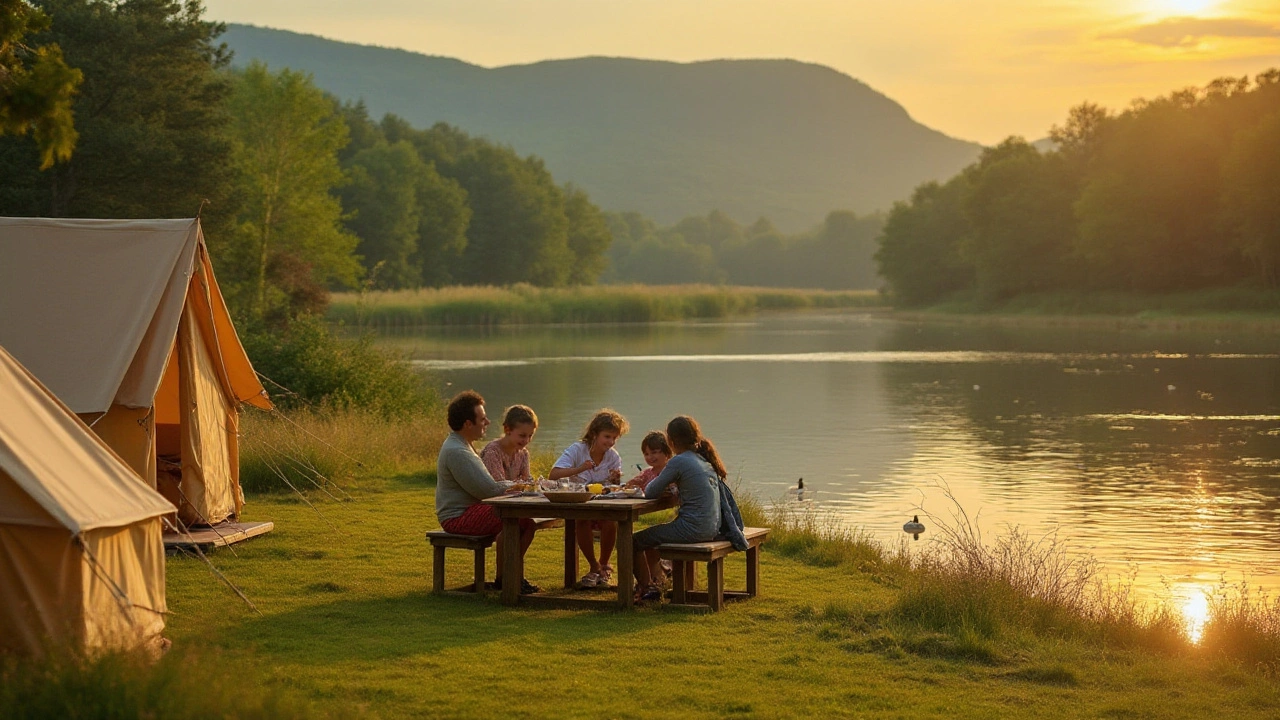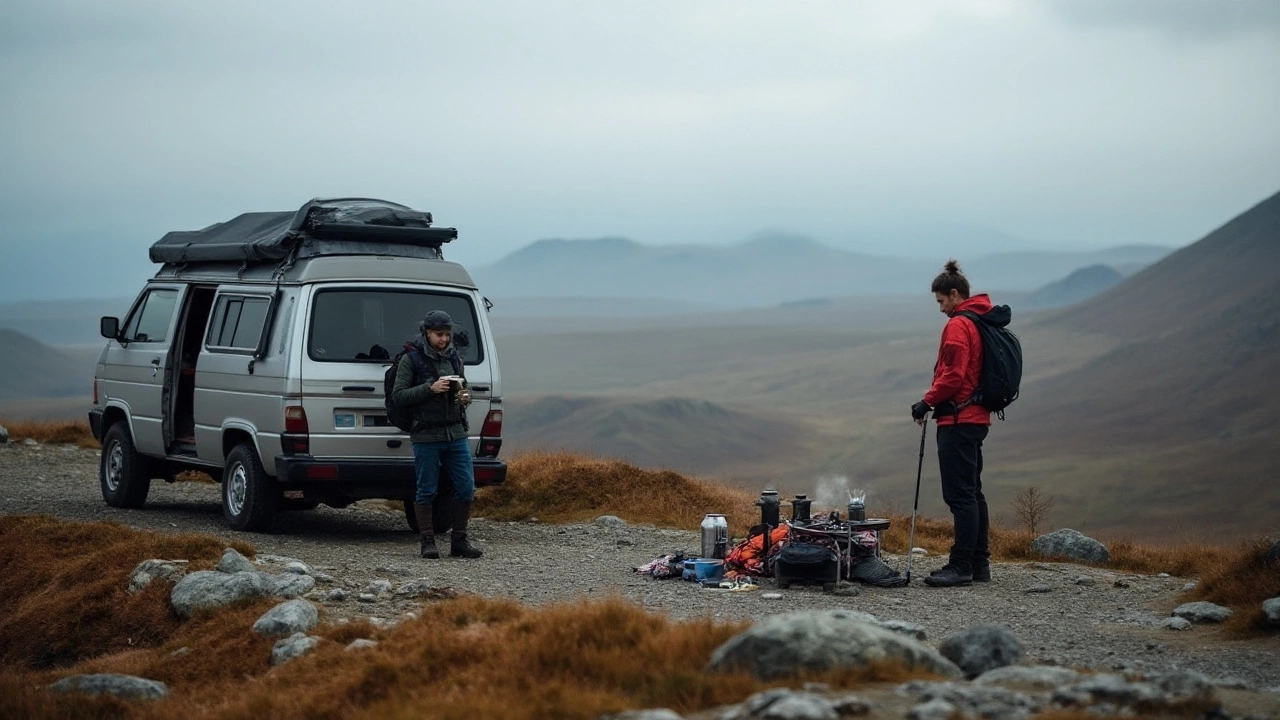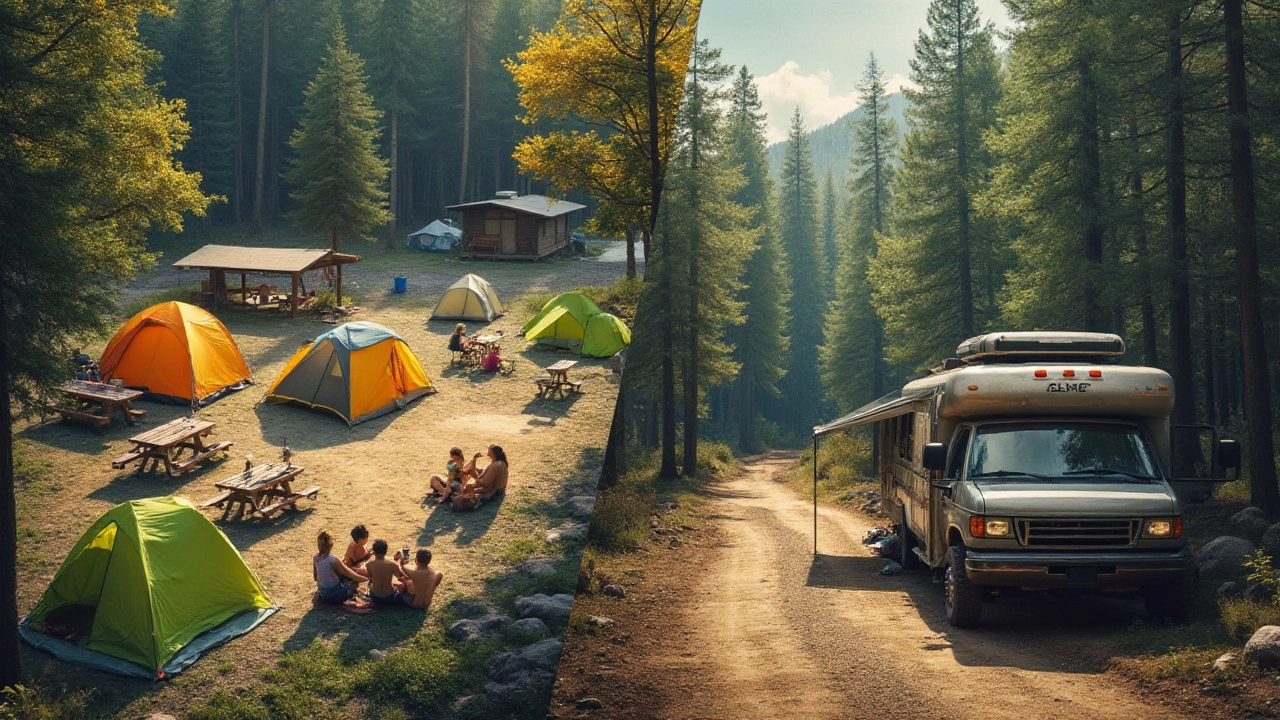Boondocking vs. Camping in the UK: Key Differences Explained
 Jan, 24 2025
Jan, 24 2025
When it comes to exploring the great outdoors, few countries offer the diverse landscapes and majestic beauty found in the UK. Whether you're a seasoned nature lover or a newbie looking for fresh air and peace, two common terms you might encounter are 'boondocking' and 'camping'. While they may seem interchangeable, there's a world of difference between these two adventures.
Imagine hitting the road with nothing but your gear and a sense of adventure. This is what boondocking offers—a chance to travel off the beaten path and truly embrace nature. On the other hand, traditional camping tends to stick closer to civilization, offering established campgrounds with a variety of amenities.
In this article, we'll delve into the distinctions between boondocking and camping, guiding you through the benefits each has to offer, and what unique opportunities they bring for those eager to unwind amid the UK's beautiful landscapes.
- Defining Boondocking and Its Appeal
- Traditional Camping Explained
- Differences in Location and Facilities
- Legal Considerations in the UK
- Choosing the Right Experience for You
Defining Boondocking and Its Appeal
Boondocking, an intriguing concept for the adventurous soul, is all about venturing into parts less traveled and disconnecting from the ordinary. At its core, it involves setting up camp in areas devoid of traditional camping facilities and conveniences. Think of it as an outdoor experience that taps into a self-reliant ethos, one that truly enhances your interaction with nature. Here, your campsite might be a stunning cliffside with sweeping views or a secluded forest clearing where your only company is the sound of rustling leaves. These spots are often free of charge, so the monetary appeal is undeniable, especially for those who wish to take long journeys without breaking the bank.
The allure of boondocking isn't just the cost-effectiveness, but also the intrinsic appeal of being off the grid. It attracts those who cherish solitude over socializing at conventional campsites. The UK offers countless landscapes perfect for this style of camping, from the serene expanses of the Highlands to the coastal escapes along the rugged cliffs of Wales. For enthusiasts, every trip becomes a treasure hunt of sorts, finding those hidden gem locations where tranquility reigns supreme, and the night sky is a canvas of stars.
Boondocking's appeal is closely tied to the freedom it offers. Unlike designated campsites, these spots don’t necessitate making reservations months in advance, nor are there regulations cuffing the distance between you and the next camper. This spontaneity can turn your travels into a genuinely liberating experience, breathing life into the idea of traveling where the road takes you. As an added bonus, boondocking also aligns with ecological mindfulness, encouraging campers to leave minimal impact, often summarized by the 'leave no trace' principle.
There was an article by National Geographic that beautifully captured the essence of boondocking. They noted,
"Boondocking strips camping to its primal elements, where luxury is found not in material comforts, but in the beauty of waking to the sun's gentle rise over untouched landscapes."It is this primal connection to nature that many find irresistibly appealing, offering a respite from the congested rhythm of everyday life.
There are challenges, of course. When boondocking, campers must be well-prepared to face nature's unpredictability. You must rely on your own resources for water, food, and power. This requires a level of planning and foresight, ensuring you have all the essentials to be both safe and comfortable. While boondocking requires more preparation than camping at traditional sites, it's often the increased closeness to nature and simplicity of life that draws people back, time after time.
For those with a thirst for adventure and a desire to reconnect with nature in its purest form, boondocking stands as an irresistible alternative to traditional camping. It's an opportunity to immerse oneself fully in the experience and beauty of the UK's varied landscapes, further enriching the love for travel.
Traditional Camping Explained
Traditional camping is the quintessential outdoor experience that many of us grew up with, often characterized by pitching a tent at a dedicated campsite surrounded by nature. From the New Forest's tranquil canopies to the dramatic peaks of Snowdonia, the United Kingdom boasts an array of campgrounds for adventurers to explore. These sites provide a range of amenities that cater to the needs of campers—be it families, solo hikers, or groups of friends. Facilities such as clean restrooms, showers, and designated picnic areas ensure comfort while still immersing you in the tranquility of the wilderness. Whether you prefer the simplicity of a grassy meadow or the convenience of electrical hookups, traditional campsites offer structured recreation that can be both rejuvenating and accessible.
One of the key advantages of traditional camping is the sense of community it fosters among campers. Sharing the space with other outdoor enthusiasts provides opportunities for social interaction and camaraderie. Each night, you might gather around a campfire under the stars, exchanging stories and forming memories. Organized activities often accompany traditional campsites, from ranger-led nature walks to outdoor movie nights, designed to enrich your stay and deepen your appreciation for the natural world. This approach to camping is not only about being in nature but also about the shared experiences that come with it, creating the perfect backdrop for adventures large and small.
However, traditional camping doesn't sacrifice excitement for convenience. Many campsites in the UK are located within or near national parks and nature reserves, ripe for exploration. You can embark on nearby hiking trails that unveil stunning vistas or try local outdoor activities such as kayaking, rock climbing, or fishing. This proximity to well-maintained infrastructure combines the thrill of an outdoor adventure with the assurance that help is never far away—ideal for those who are new to camping or prefer some level of comfort and security.
"Camping is nature's way of promoting the motel business." - Dave Barry, American humorist and camp enthusiast.
Of course, the UK weather is notoriously unpredictable, so traditional camping sites are better prepared for inclement conditions than off-grid alternatives. Many provide shelters or covered eating areas where campers can gather to enjoy meals away from the elements. Additionally, the on-site staff can offer guidance and assistance in the event of unexpected trouble—an invaluable resource for first-timers learning the ropes of the great outdoors. It's this blend of accessibility, comfort, and community spirit that make traditional camping a popular choice for an escape to the British countryside.

Differences in Location and Facilities
When it comes to the subject of boondocking versus camping, the most striking differences revolve around where your adventures take you and what amenities are provided—or not provided. In the UK, traditional camping often means setting up at designated campsites equipped with an array of services like electrical hookups, communal showers, and restrooms. These sites are usually situated near tourist attractions or natural wonders, ensuring easy access for people who value convenience over solitude. Recognizable names such as Haven and Forest Holidays offer sought-after spots where campers delight in the comfort and community spirit found there.
Boondocking, by stark contrast, lures the adventurous souls yearning for an off-the-grid experience. It involves parking in remote, often wild locations far removed from formal camping hubs. Think of verdant farmland edges, windswept moors, or hidden forest clearings where nature’s beauty remains untainted by signposts or boundary fences. According to a study conducted by Pitchup, over 80% of campers are now considering wilder spots for their getaways, drawn by the promise of serenity and escapism.
Yvon Chouinard, founder of Patagonia, once said, "The more you know, the less you need." This sentiment captures the essence of boondocking, emphasizing minimalist living without reliance on modern convenience.
The facilities—or conspicuous lack thereof—is another crucial consideration. Campers typically enjoy amenities including hot water, wi-fi connectivity, cooking facilities, and even entertainment zones. Many UK campsites go the extra mile, providing activities ranging from guided hikes to canoeing adventures tailored towards families. By contrast, boondockers often revel in the rawness of their environment, mastering self-sufficiency with portable solar panels, refillable water containers, and snug sleeping bags. Here, the experience is about crafting your journey with what you bring in, leaving the land as you found it. A wild camping enthusiast summarized his journey aptly, "It's not about where you sleep but who you become while you're there."
In the changing landscape of outdoor pursuits, both boondocking and camping offer unique experiences marked by their settings and resources. While the comfort of structured campsites may appeal to those starting their nature-bound journeys, the more daring might seek out the thrill of wild, untouched locations. Regardless of your choice, there's an unparalleled joy in living under the skies, embraced by nature and its simplicity.
Legal Considerations in the UK
When embarking on a boondocking or camping adventure across the UK, it's crucial to get acquainted with the legal landscape pertaining to outdoor stays. Unlike some countries that offer more lenient regulations on where one can set up camp, the UK’s rules can be as varied as its landscapes. This diversity is partly due to the array of land ownership structures in place and the rich history tied to land use rights.
Firstly, private land dominates much of the UK, which implies that permission is typically required to camp or park your campervan for the night. Without explicit consent from the landowner, you might find yourself inadvertently trespassing. In some national parks and remote areas, especially in Scotland, the tides have shifted towards a more inclusive outdoors policy. The Scottish Outdoor Access Code is a well-regarded framework that permits wild camping provided campers abide by guidelines aimed at preserving nature and respecting other land users. Unfortunately, similar freedoms aren’t extended across other regions of the UK.
Permissible Boondocking Areas
If you're set on enjoying a boondocking experience, it's a good idea to familiarize yourself with areas that permit such activities. Several free campsites do exist, often maintaining a first-come, first-served policy with limited amenities. They're a fantastic way to enjoy the solitude boondocking offers without flouting regulations. Places like the Lake District have designated 'motorhome stopovers' that encourage overnight stays in picturesque and legally compliant settings.
“Respect, protect, enjoy—that is the spirit of wild camping in much of Scotland today,” notes a ranger with the Scottish National Heritage.
Another route to consider is staying at Brit Stops, a network of host sites offering free overnight parking for motorhomes, which are often found at rural pubs and farm shops. This setup not only supports local businesses but grants tourists the chance to engage with unique rural experiences.
Legal Restrictions and Enforcement
In England and Wales, it is a different story. Legal restrictions are tightly enforced due to higher population densities and the prevalence of private land ownership. Epping Forest in London is an exception, allowing campers to immerse themselves in woodlands settings under specific guidelines. Elsewhere, Dartmoor National Park offers its own set of rules and zones where wild camping is recognized, albeit in tents only.
| Region | Wild Camping Status |
|---|---|
| Scotland | Permitted under guidelines |
| England | Restricted with few exceptions |
| Wales | Restricted with few exceptions |
| Northern Ireland | Permitted with restrictions |
Understanding these distinctions is critical for avoiding fines or unpleasant encounters with law enforcement. Many national parks have park rangers who occasionally patrol popular outdoor areas, and encountering them without proper permissions could lead to fines.
For enthusiasts eager to explore these stunning locales, the best approach remains camping at designated sites or obtaining landowner permissions where required. This mode of exploration fosters mutual respect for local customs and ensures that these precious natural reserves remain open and accessible for future generations of adventurers hoping to experience the UK’s unique blend of history and natural wonder.

Choosing the Right Experience for You
When trying to decide between boondocking and traditional camping in the UK, it's important to consider what kind of experience you're seeking. Each has its own charm and set of challenges, catering to different types of adventurers. If your idea of a perfect escape involves immersing yourself in nature with minimal distraction, boondocking might be the path for you. This option places a premium on self-sufficiency and resourcefulness, often appealing to those who relish the idea of being off the grid.
For boondockers, the allure lies in the freedom it provides. Imagine choosing your spot in a remote woodland or near a hidden lake, far from the bustling campgrounds. The joy of solitude and pristine surroundings is unmatched. However, this choice comes with the need to be well-prepared. Boondocking involves setting up your own campsite, often without basic facilities like running water or toilets, meaning you must bring all essentials with you and be adept at minimizing your environmental footprint.
Traditional camping, on the other hand, provides a structured environment where you can enjoy the comforts of established campsites. These sites often offer amenities such as shower blocks, restrooms, and sometimes even shops and eateries. It's an opportunity to enjoy outdoor activities while still having easy access to modern conveniences. Families with children or first-timers might find this option more accommodating and less challenging.
Understanding Your Preferences
Understanding your own preferences is key to making the right choice. If you crave a deeper connection with nature and don't mind the extra effort, then boondocking is your calling. It offers the thrill of adventure and a sense of accomplishment as you learn to thrive in more remote settings. Conversely, if comfort ranks high on your list or you're just starting out, traditional camping offers a gentle introduction to the joys of the great outdoors without the need for extensive preparation.
Legal and Safety Considerations
Another factor to weigh is legal considerations. In the UK, while camping at a registered site ensures compliance with regional regulations, boondocking—or wild camping—often requires more caution as it may not be legal in all areas. Staying informed and respectful of local laws is crucial. Before setting out, research the rules of your chosen location to ensure a trouble-free experience. Safety should also be at the forefront of your planning. Whether you're boondocking or camping, always tell someone your plans, and consider bringing safety gear like a map, GPS, first aid kit, and a reliable means of communication in case of emergencies.
"The charm of boondocking lies in its raw simplicity, offering a solitude seldom found in traditional campsites," says John Smith, an outdoor expert and seasoned boondocker.
Ultimately, whether you choose boondocking or traditional camping, the UK provides a spectacular backdrop for both. From the rolling hills of the Lake District to the rugged coasts of Devon, each option invites you to reconnect with nature in your own way. By carefully considering your personal preferences and logistics, you can tailor an outdoor experience that will reward you with lasting memories and a deeper appreciation of the world outside.